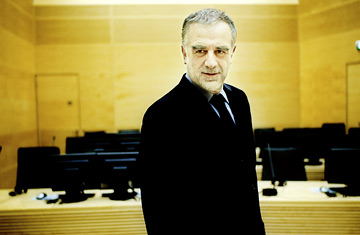
Luis Moreno-Ocampo Luis Moreno-Ocampo.
In the eyes of Luis Moreno Ocampo, the war in Darfur will end thousands of miles from the killing fields, in a narrow, wood-paneled room carved out of an old parking garage in the Hague. It is here that Moreno-Ocampo, the Argentine prosecutor of the five-year-old International Criminal Court (ICC), intends to bring to justice the perpetrators of Sudan's genocide. Moreno-Ocampo and his team of lawyers will occupy one side of the courtroom, presenting their evidence to a three-judge panel that will decide the case. On the other side will sit the defendant, Ahmad Muhammed Harun, Sudan's former Interior Minister, whom Moreno-Ocampo has charged with orchestrating the slaughter in Darfur. "The prosecution of Harun will break the system that is responsible for these crimes. It will force a change in behavior," says Moreno-Ocampo. As he imagines the possibilities, a smile crosses his face. "I would love to be in court with Harun. I have a great case."
But there are a few problems. Nearly six months since Moreno-Ocampo gave the U.N. Security Council a warrant for the arrest of Harun and Ali Kushayb, a leader of the government-backed janjaweed militia, neither man has been delivered to the Hague. After initially cooperating with Moreno-Ocampo, Sudan now rejects the ICC's authority to try those involved in Darfur's atrocities. And with the world pushing for a truce between the government and Darfur's feuding rebel groups, the cause of justice may well become a casualty of a negotiated peace. Having spent 18 months preparing the case against Harun, Moreno-Ocampo doesn't know when, if ever, he will actually face him in court. "This law is still new. This idea of arresting people who are still active in militias or in government--that's a new dimension." He pauses for a beat. "The world is complicated," he says.
Since arriving in the Hague in 2003, Moreno-Ocampo, 55, has become the public face and voice of the ICC, the first permanent global court devoted to prosecuting crimes against humanity. Though largely obscure outside legal and human-rights circles--and hampered by the fact that the U.S. and a number of other countries are not state parties to the court--the ICC has raised its profile in recent months, opening its first two trials against warlords from Congo. It will gain wider public attention with the Nov.2 U.S. release of Darfur Now, a Syriana-style documentary that chronicles Moreno-Ocampo's pursuit of Harun. Appearing at screenings of the film this fall in Toronto and New York, Moreno-Ocampo received standing ovations, not to mention an audience with Brad Pitt and Angelina Jolie.
Moreno-Ocampo speaks in clipped, declarative sentences and sports the three-day stubble of a man who constantly looks as if he just got off a long-haul flight. When I met him for breakfast at the ICC's cafeteria in late October, he ordered two coffees at a time, to avoid having to go back for refills. Though he has indicted nine people from three different conflicts, Moreno-Ocampo knows he needs to deliver results in the form of high-profile convictions to ensure that the court evolves into something more than a monument to good intentions. "The next few years will tell whether the ICC is a success or failure," says Juan Méndez, president of the International Center for Transitional Justice. "If he ends up only producing two or three trials and has 20 outstanding warrants, the appetite for international criminal justice will fade away completely."
Moreno-Ocampo gained fame in Argentina in the '80s for prosecuting human-rights abuses committed by the country's ruling military junta. In 2003 he signed on for a nine-year term as prosecutor at the ICC. Unlike earlier tribunals--such as U.N.-sponsored courts for war crimes in the former Yugoslavia, Rwanda and Sierra Leone--the ICC is able to prosecute atrocities in conflicts that are still raging.
That mandate led Moreno-Ocampo to Darfur. After the Security Council voted in 2005 to authorize the ICC to investigate war crimes committed there, Moreno-Ocampo launched a probe that involved deposing hundreds of witnesses in 17 countries. By the end of 2006, the prosecutor's team produced evidence of Harun's role in planning and executing the killing campaign against Darfur's civilians. In a bracing scene in Darfur Now, a female rebel soldier, whose son was killed by the janjaweed, tells her comrades of "a man named Ocampo" who will deliver punishment to their enemies.
Moreno-Ocampo believes in the inevitability of international justice, the idea that even the world's worst thugs will face a reckoning in court. "To me, he really seems like a Don Quixote figure," says Ted Braun, director of Darfur Now. "He's one man, working alone, taking on the world with a great vision of what he can do, but without a lot of overt backing." If that bothers Moreno-Ocampo, he doesn't show it. Finishing his coffee, he tells me that the ICC is helping to establish a new approach to international relations, in which states interact "on the basis of laws, not on the concept of friends and enemies. There are still criminals, but no enemies. That is the idea." Moreno-Ocampo is working to make the idea real.
